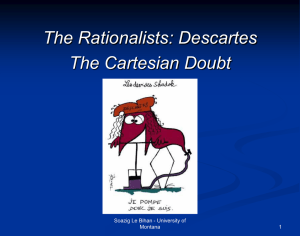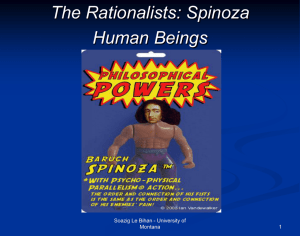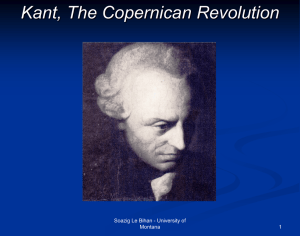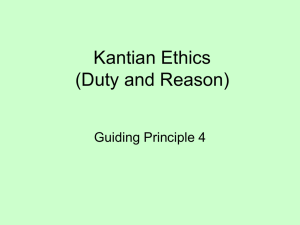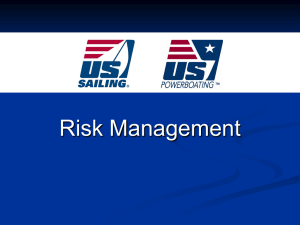Duty Theory - Soazig Le Bihan
advertisement
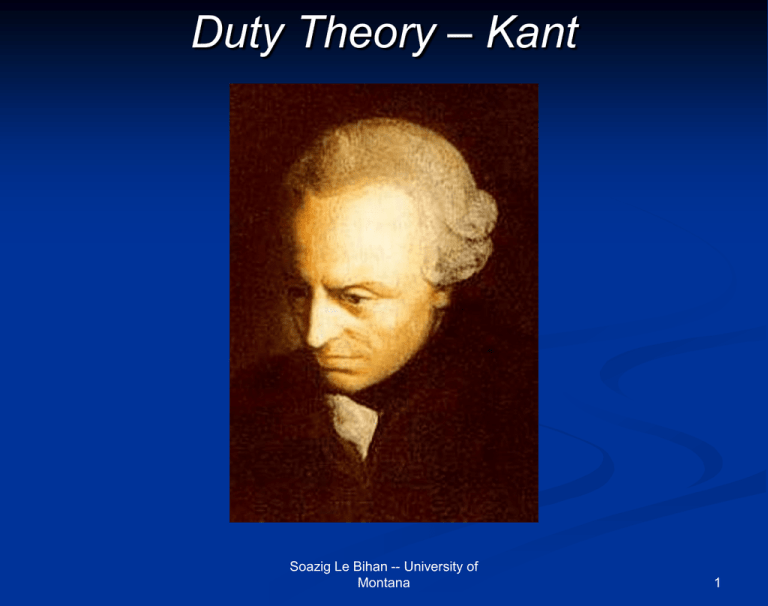
Duty Theory – Kant Soazig Le Bihan -- University of Montana 1 Introduction Reminder on Utilitarianism: Assessment in regarding the consequences No absolute moral rules Duty Theory: the opposite view: Assessment in regarding the motives Moral rules are absolute Founding Father: Kant (1724-1804) The man The philosopher Soazig Le Bihan -- University of Montana 2 Outline Duty Theory: Acting for the sake of duty only Duty and Universality Rationality as the Foundation of Morality Objections and Answers Conclusion: Kant’s legacy Soazig Le Bihan -- University of Montana 3 Duty Theory: Acting for the sake of duty only Basic Insights: - Consequences are uncertain: Motives are the only thing for which we are fully responsible - We ought to do our duty Ex: consoling your best friend Duty Theory: Duty theory is the view that what is right to do is to act in conformity with, and for the sake of duty What is the difference between the two? Soazig Le Bihan -- University of Montana 4 “In conformity with” vs “for the sake of” duty Three kinds of motives: Example: the grocer and the kid (1) Mediate desire – calculating person (2) Immediate desire – friend of mankind (3) For the sake of Duty – coldhearted man of principle Duty Theory: (2) and (3) are better than (1) (3) is better than (2) -- reliable reason (autonomy) vs changing desires (heteronomy) The true moral life is based on reason, not desires. Soazig Le Bihan -- University of Montana 5 Duty: Conclusion Duty Theory: (1) Moral actions assessed on the moral value of our motives (2) Valuable actions: these performed in conformity with duty and for the sake of duty only. How do we know what our duty consists in? Soazig Le Bihan -- University of Montana 6 Outline Duty Theory: For the sake of duty only Duty and Universality Rationality as the Foundation of Morality Objections and Answers Conclusion: Kant’s legacy Soazig Le Bihan -- University of Montana 7 Duty and Universality: The Universalization Rule Basic Idea: Our duty is to follow the rules that allow us to live in harmony Our duty is then to follow the rules that we can will others to follow The Universalization Rule (the “Categorical Imperative”): One’s duty is to act only according to that maxim by which one can at the same time will that it should become a universal law Soazig Le Bihan -- University of Montana 8 Duty and Universality: The Test The Universalization Test: Determine the maxim of your action – can be hard but not impossible Universalization? – a requirement of consistency Examples: - Is it right to become a slaveholder? – direct contradiction - Is it right to lie? – direct contradiction - Is it right to neglect to develop our talents? – indirect contradiction - Is it right not to help others? – indirect contradiction Soazig Le Bihan -- University of Montana 9 Duty and Universality: Conclusion The Universalization Rule: (1) We do our duty when our maxims of actions are universalizable (2) The requirement of universalization is a requirement of rational consistency. To be moral is just to be rational Soazig Le Bihan -- University of Montana 10 Outline Duty Theory: For the sake of duty only Duty and Universality Rationality as the Foundation of Morality Objections and Answers Conclusion: Kant’s legacy Soazig Le Bihan -- University of Montana 11 Rationality as the Foundation of Morality From Rationality to Autonomy To be rational is the only way to be truly free: True Freedom is not about performing arbitrary acts True Freedom is Autonomy, i.e. acting according to reason Examples: Carrot or chocolate cake? Drinking night vs exam So: We are truly free when we make rational choices, when we are autonomous. Soazig Le Bihan -- University of Montana 12 Rationality as the Foundation of Morality From Autonomy to Dignity and Respect Autonomy and Dignity: Human Dignity comes from humans’ being capable of following our duty, irrespective of their desires Human Dignity comes from humans’ being capable of autonomy Dignity and Respect Anyone ought to respect the autonomy of rational agents. Soazig Le Bihan -- University of Montana 13 Rationality as the Foundation of Morality Respect The Rule of Absolute Respect (Second formulation of the Categorical Imperative) Act so that you treat humanity, whether in your own person or in that of another, always as an end and never as a means only. What does it means? Soazig Le Bihan -- University of Montana 14 Rationality as the Foundation of Morality Using people as means / as ends Using people as means: Tuskegee syphilis experiment Superbad The Deferential wife Lack of respect = Deprivation of the means for autonomous behavior Soazig Le Bihan -- University of Montana 15 Rationality as the Foundation of Morality Using people as means / as ends Using people as means but also as ends: HIV experiments Superbad What is absolutely wrong is to use people as means ONLY Soazig Le Bihan -- University of Montana 16 Rationality as the Foundation of Morality: Conclusion (1) To be rational = to be truly free – autonomous = to have dignity = to be worthy of respect (2) Rule of Absolute Respect = respect of one’s autonomy – never use others as means only (3) Rationality is the foundation of morality: As rational, autonomous agents, we understand that our duty is to do whatever is respectful of all others’ rational agents autonomy, including ousrselves. As rational, autonomous agents, we understand that our duty is to do whatever we could will be done by all others. Soazig Le Bihan -- University of Montana 17 Outline Duty Theory: For the sake of duty only Duty and Universality Rationality as the Foundation of Morality Objections and Answers Conclusion: Kant’s legacy Soazig Le Bihan -- University of Montana 18 Objections and Answers 1. The Problem of Absolute Rules Duty Theory: Rules of morality are absolute. They do not suffer any exception. Ex: It is wrong to lie Objection: There are situations for which an exception is necessary Ex: Gestapo at your door Answer: - Uncertainty of consequences - Full responsibility of your motives only Soazig Le Bihan -- University of Montana 19 Objections and Answers 2. Rational agents only? Duty Theory: Rules of morality makes sense among rational, autonomous agents. Objection: What about non rational beings? Kant on animals and the mentally impaired Answer: Distinction between: - Moral obligations - Moral consideration Soazig Le Bihan -- University of Montana 20 Objections and Answers 3. The Problem of Character Duty Theory: To act morally is to act in conformity of duty and for the sake of duty only. Ex: Friend of mankind vs cold hearted person Objection: What about caring for others? Ex: Your friend at the hospital Answer: True Kantians stick to their guns here: feelings and emotions do not count for being a moral agent. Only virtue ethics addresses this concern Soazig Le Bihan -- University of Montana 21 Objections and Answers Conclusion Strongest objections: (1) Absolute rules for motives only = Crucial difference with Utilitarianism. (2) The problem of character = Crucial difference with Virtue Ethics These objections don’t show that Duty Theory is false, but show what counter-intuitive aspects it has. Soazig Le Bihan -- University of Montana 22 Conclusion Insights to keep from Kant: (1) Morality ultimately grounded in rationality (2) The moral life = rational life (3) Universality of the moral point of view (4) Beauty of duty What is missing or problematic: (1) The question of absolute rules and the neglect of the consequences – a theory for personal choices (2) The neglect of character Soazig Le Bihan -- University of Montana 23
